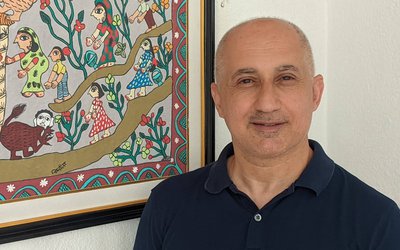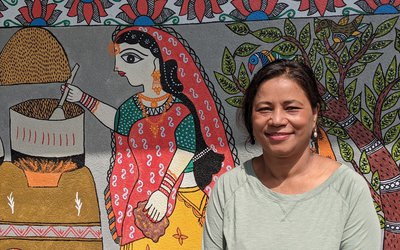YUBARAJ BHUSHAL, secretary of the National Planning Commission, joined civil service back in 1980 as a section officer. He was promoted as a secretary two and a half years ago. Bhushal,who completed Master’s in political science from Tribhuvan University, also did a post graduate diploma from Gernal in 1995 and a Master’s from Asian Institute of Technology, Bangkok. Bhushal spoke to New Spotlight on various issues. Excerpts:
The National Planning Commission is in the budget preparation process. What are going to be the main priority sectors in the budget?
We are in the final year of the ongoing Three Year National Plan. The MDGs are also going to be completed by 2015. So, our focus will be to on the priorities given by MDGs in the social sector. We will also focus our attention on sustainable energy, that is, hydropower. In technical infrastructure, we will include middle hills highway, storage power project and Hulaki road. We are also proposing to build 10 cities along the middle hills highway, construct international airports in Nijgadh, Pokhara and Bhairahawa. In the social sector, our priority is going to be in health and education. Our mission is to achieve education for all by 2015. One of the major challenges of the present day is unemployment. Nearly 3 million youths are out of the employment net now. Although ongoing Three Year Interim Plan aimed to bring employment oriented, inclusive, pro-poor projects, we have been unable to direct our economic growth toward those sectors. We are able to make our plans inclusive as we have already tabled an inclusive bill in the parliament. Our budget has remained pro-poor since the eighth national plan. Due to our focused program, we are able to bring down the level of poverty to 25.16 per cent. Our target is to bring it down to 21 percent. The coming budget will be based on a medium term framework. We are now concentrating on meeting the target set by the three-year plan.
Prime minister Baburam Bhattarai has said that he will double the budget in the agriculture sector. How is NPC working in that direction?
Of course, agriculture sector is yet to get its proper share in the national budget. As you know, 74 per cent of our population depends on agriculture and its related activities.However, its contribution to GDP is just over 35 percent. A large number of people are employed in the agriculture sector but it is undermined at the policy level. Agriculture sector in Nepal is like something dangerous, dirty and difficult. Agriculture sector failed to lure our youths. They prefer to go Gulf countries for employment rather than to work in agriculture. This is because we are unable to change the pattern of working. We are unable to bring new technologies like power tillers. The government is now considering providing micro-power tillers to rural areas. We don’t have marketing problems because of the extension of rural road networks. Agriculture sector is poorly managed and it is unable to provide rate of return. We need to improve the overall budget in marketing, research, extension, road and irrigation. There is a certain weakness in extension. In the coming budget, we are targeting to send technicians in the agriculture and veterinary sectors. This will increase employment opportunities. There are problems of marketing, research and crop failures due to low grade seeds. Even prime minister Dr. Baburam Bhattarai has already made it clear that there is the need to double the budget in the agriculture sector. Now, the annual budget allocation is just 3.5 percent. We are going to double the budget in agriculture sector, not the Ministry of Agriculture. If we mobilise volunteers, there will be the need of more money. Yes, we are working to increase the budget in agriculture sector.
What is the state of MDGs?
Our recent studies have shown that Nepal is in a position to meet many targets set by MDGs. There are few problems in poverty and hunger eradication, particularly as they relate to food security. Our problems related to supply of food in the districts have been creating troubles. We also need to change the food habits. We need to feed our population on the basis of nutrition values. We need to encourage the population to grow more nutritious foods. We need to change the food habits. We need to introduce better food technology. We need to protect and promote local production. We have to increase the calories in food. We have a little difficulty on the agenda of sustainable environment goal. Despite all these, we have been working in the Millennium Development Goals in an acceleration framework and turning to MAF. There are certain problems in sanitation, including the lack of gender friendly toilets. We are also suggesting the Ministry of Health to provide sanitary pads to girl children to encourage them to attend schools. This will decrease the drop out rate.
At a time when we have been talking about sustainable development, we are also promoting roads which destroy the nature. How do you look at this?
In the first earth summit held in Rio in 1992, Nepal took part under the leadership of then prime minister Girija Prasad Koirala. Now another earth summit is going to take place in June this year, which is known as Rio 20. The government has already decided to send a Nepalese delegation under the leadership of the prime minister. The Rio summit will decide the new development paradigms, like green economy, green enterprises, green growth, green GDP and green system. Food security will be one of the agenda for Rio 20. Disaster Risk Management and Disaster Risk Reduction will be the other agenda. These issues will also get a priority there. Nepal will need to apply them here. Nepal has already got the NAPA, LAPA and CAPA. We are giving a priority to road sector because people see it as a basic aspect of development. We are now planning to make IEA and EIA as mandatory to construct roads. We are working on this. Some of the weaknesses are that people are spending money in roads because they can spend it as per their needs. We want to increase the budget and encourage the private sector to invest more money in the agriculture sector. This will help to increase our economic sector. We need to control the scattered development budget.
What about DRR and DRM?
I am not satisfied with the present approach of DRR and DRM. There is a lack of coordination in the areas of disaster risk. The time has come to have a separate agency like an authority to maintain an inter-sectoral coordination. In the coming 13th national plan, we want to establish a unit in all the offices with certain budgets set aside for the. You see, DRM is a cross-cutting issue.
- TANAHU HYDROPOWER PROEJCT: A Significant Achievement
- Apr 15, 2024
- AMBASSADOR HANAN GODAR: Sharing Pain With A Nepali Family
- Mar 30, 2024
- VISIT OF KfW AND EIB TO NEPAL : Mission Matters
- Mar 25, 2024
- NEPAL BRITAIN SOCIETY: Pratima Pande's Leadership
- Mar 24, 2024
- NEPAL ARMY DAY: Time To Recall Glory
- Mar 15, 2024
















